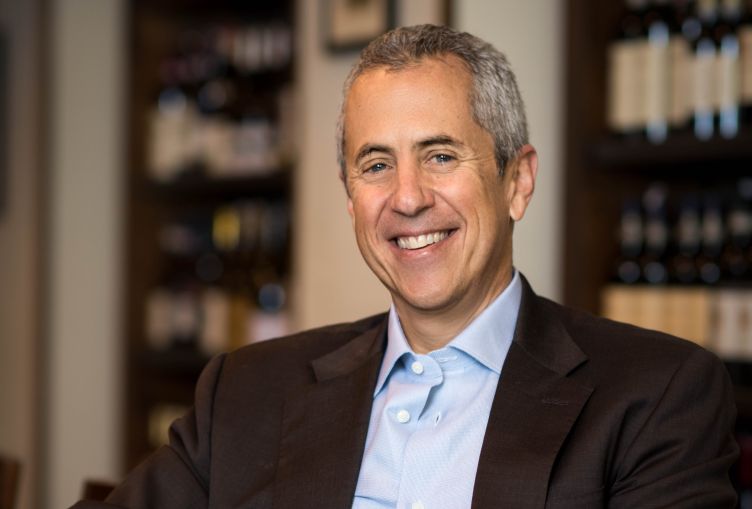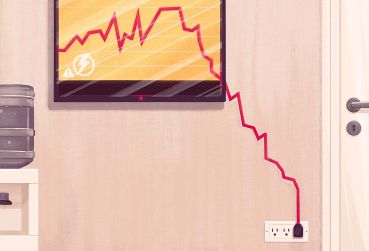Shack Daddy Danny Meyer Talks Leases, Neighborhoods and Restaurants
By Lauren Elkies Schram June 10, 2015 11:05 am
reprints
Danny Meyer appears to be on a roll right now, no pun intended.
The king of the $2 billion Shake Shack burger chain recently made it onto Time’s list of the 100 most influential people in the world and then saw the opening of his eagerly-awaited restaurant Untitled at the new Whitney Museum of Art in the Meatpacking District, along with the more casual Studio Cafe on the museum’s top floor.
As the chief executive officer of Union Square Hospitality Group, Mr. Meyer has overseen the opening of a slew of notable restaurants from Shake Shack (65 national and international locations and counting, traded on the NYSE as SHAK) to Gramercy Tavern to Maialino to Union Square Cafe, the latter of which is famously facing termination of its lease this year.
At a meeting over breakfast at USHG’s Maialino last month, Mr. Meyer munched on his off-the-menu order of two poached eggs on a piece of toasted brioche and cappuccino while chatting with a reporter about the fate of Union Square Cafe, partnering with Related Companies in Union Square Events, the catering business of USHG, and the impetus for this year’s opening of Porchlight, a Southern-inspired bar in far West Chelsea.
Commercial Observer: Everyone wants to know what’s up with Union Square Cafe?
Mr. Meyer: Starting with me. If I asked 20 times today, I asked 30 times today.
Are you a victim of your own success having created this neighborhood with Shake Shack and Union Square Cafe?
I absolutely don’t look at us as victims whatsoever. Here is what I have thought about a lot: if you are a renter, if you are fortunate, you get to create an economic wave and then ride that economic wave for the term of your lease. If you are fortunate enough to be a buyer you can create a wave and ride it indefinitely. So being a renter doesn’t make us a victim, it means that we got to enjoy riding that wave until we were unable to. In the case of Union Square Cafe, 30 years ago we had a lease that was below market rent. We were paying $8 per square foot for the first year that Union Square Cafe opened.
What are you paying now?
I don’t remember, but it’s well under $100 a square foot.
And what is the current asking rent?
You know, we haven’t had this conversation for so long that I don’t even know.
What percentage more is the current asking rent?
If I’m not mistaken it was about 300 percent.
If you were to stay at 21 East 16th Street, how much of an investment would the building require?
Our estimate was probably north of $4 million and then we were only being offered a short lease at a very high price per square foot. You can’t even make your investment back in 10 years so you are essentially working for the landlord and in 10 years you are back in the same pickle, meaning that you can’t give your staff a raise, so, it’s just a tough equation. It will probably work for somebody, my guess is that it will work for a steak restaurant, or a chain, or a burger place that doesn’t have some of the fixed costs that exist in a place like Union Square Cafe, like an executive chef, sous chefs, a pastry chef, wine director, florist, linens, etc.
Why don’t you put in a steak restaurant, a chain or a burger joint?
Because for me it’s Union Square Cafe or nothing. It’s too much of an emotional connection with a space to turn it into anything other than Union Square Cafe. I still hold out a sliver of hope that we can stay there but I don’t think it can happen.
Some people have said that you sort of got yourself in a jam there with refusing to pay the new rent, that in fact you could afford it?
I could, but that’s not a viable business model. So if you understand how the fine-dining restaurant business works, you can’t have a business where in order just to pay the rent you can’t give your staff raises. And sure I could reach into my pocket and just pay it but why would I do that? Why would I essentially ask our staff to work for no promotions and raises just in order to pay the rent?
I just want to be very clear—and I would like to be quoted—I do not blame our landlord. It is true that the underlying value of his building has to have increased because of the progress in Union Square over the past 30 years. I would like to think we had something to do with that. But it is not his fault that his building is a rent-controlled apartment building. Even if his building has become incredibly valuable, he is restricted from receiving enormous rent increases from his rent-controlled tenants and so therefore he has an obligation … to achieve as much possible rent from the ground-floor spaces, which are not restricted and therefore there is no strategic reason to care whether it is Union Square Cafe, or a pet store, or a chain restaurant. I think the press has largely tried to pin it that we have a beef with him—no we just have a problem we have to solve, that is all it is.
Union Square Cafe will survive because it’s just too important to me, our staff members are too important to me, and as my very first restaurant, it’s the mother yeast of our company. I’m being a stickler about trying to find a new home within our neighborhood, not just because of the name, but also because of the 30-year-old relationships we have with Greenmarket farmers and regular guests who dine with us several times each week. I think it would survive somewhere else; I think we can open it up in Long Island City and Brooklyn, but it just wouldn’t…
It’s like Second Avenue Deli not being on Second Avenue.
It’s a little strange isn’t it? Although, I think that works. I feel like you know one of the ways we have always created restaurants—I have named many restaurants after where they are—Gramercy Tavern, 11 Madison Park, The Modern, North End Grill, and part of why I do that is because I want the restaurants to truly feel like they are part of their neighborhood. It’s the same way that a good wine is named for where it was grown. I want them to taste like where they are … [but] ultimately when your lease runs out, it could be a dangerous thing.
Do you have an in-house person handling the real estate search?
In-house and it’s not her full-time job, but she has been on the prowl for close to six months and we have had a couple of near opportunities. There are unfortunately in this neighborhood very few businesses that are strategic landlords. First of all, I want it to be no more than a five-minute hand truck push from the Greenmarket so we can keep using the same farmers and produce. And also that makes sense because if you are a lunch regular I think you are willing to walk five minutes.
Have you found any viable properties?
We found a lot of spaces over time, but we just haven’t been able to convert them into leases.
In terms of Porchlight, why did you want to open a bar?
Well, one of our long-time managing partners from Blue Smoke was the one—his name is Mark Maynard-Parisi. I have been increasingly encouraging people on our team who know how we do business to express their own entrepreneurial passions and not just wait for me, so Mark was really the only who initiated this. [It is in] a huge warehouse building where our catering company Union Square Events is. It is where the Tunnel nightclub used to be and so for years we have been talking about this corner, this huge building from 11th to 12th Avenues between 28th and 27th Streets and the time just felt right to do something there, especially with the Related project that is about two years away. [There is a] huge amount of residential, a huge number of art galleries and an absence of places to eat and drink—or a dearth I guess is a better way to put it.
Crain’s New York Business reported that you are looking to open a 40,000-square-foot food hall at Hudson Yards. True or false?
It’s true that Crain’s reported that rumor. We don’t comment on any prospective business plans until and unless they are real or confirmed. For now, there is no deal to confirm or discuss.
Related is a partner in Union Square Events. How did you hook up with Related to begin with?
Five years ago we needed a strategic partner. We started Union Square Events two years before the recession hit and we were just starting to gain some momentum and the bottom fell out of our business because you were either someone who could no longer afford to host a party or if you could afford to host a party you were someone who didn’t want to be seen hosting a party. And we were really scrambling around trying to find a business model. We had taken on a significant amount of debt to build our remarkable commissary. It is a gorgeous state-of-the-art kitchen. We had taken on a lot of debt, with no apparent way to repay it. The good news was that right about this time the Mets approached us to do part of the food service at their brand new Citi Field, which opened in 2009, and Related took note of that because Steve Ross owns the Dolphins. They had what we needed and we had what they needed.
What percentage of the company do they own?
I think that is private information. I wish I could tell you. I do remember that we are the controlling member of the relationship.
What opportunities have Related brought you?
They are constantly whispering in our ear about opportunities. I think the biggest one is the one you were talking about, which is the Hudson Yards project. And I think that because we have known [about] the Hudson Yards project and because of our relationship with Related I think we have insights into the western or southern real estate migration for several years and that has informed the confidence in which we have opened places like North End Grill, the confidence in which we have opened places like Porchlight and also Untitled.
A couple of chefs I talked to said there is this trend of restaurateurs partnering with landlords or hotels and opening eateries.
We’ve done that at Maialino and Marta, our pizza restaurant on 29th Street [in the Martha Washington Hotel].
How does it structurally work?
It’s different every time. We own the business but to the degree the hotel takes responsibility for the build-out, there’s a revenue share or at least a profit share until such a point that the hotel gets paid back. It’s almost like being a banker but your successes are tied to one another. So Marta, the restaurant is practically a substitute for their lobby, they don’t even have a lobby there.
As a result of the Union Square Cafe saga, are you going to try and buy the real estate where you open a business?
I will always ask the question, could we buy it, or is it just available for lease? That is a question I never even asked before.
You could focus exclusively on sites you can buy.
With Union Square Cafe I think that time is not our friend. The lease concludes on Dec. 31, and I have a commitment to our staff to find a new space. Union Square Cafe will live on. There may very well be a small gap in time between closing up the restaurant and opening up the new one, but not a large gap in time.
Will it be identical or will you hit refresh?
I haven’t even thought about that. I would like to keep all the art. [But] let’s face it: Union Square Cafe was built in 1985. I think the design has endured 30 years but I also think the restaurant wants to capture the spirit and the feeling of Union Square Cafe and be a design that is relevant for the next 30 years and I would do that even if we were staying. Part of the investment amount that I named earlier, that was north of $4 million, would be for infrastructure and part of it would be to refresh how the restaurant looks and feels.
If someone was starting out as a restaurateur, what would you tell them to do from a real estate perspective?
Bet on a neighborhood. Try to buy if possible. But realize that even if you can’t buy, if you make a good bet on an up-and-coming neighborhood early, restaurants are really wonderful harbingers of future development, future residential development, future retail development. Get a good, long lease and enjoy the fruits of having an underlying lease that is below what your competitors will pay.
Who do you turn to for advice on what neighborhoods to bet on?
Nobody. It’s kind of, it either feels right or it doesn’t. Shake Shack is now a public and separate company and it now gets real estate advice because Shake Shack has a growth plan that it names and it must hit. Union Square Hospitality Group, which I am the CEO of, grows iteratively, rather than with a strategic growth plan. And it has always been based on what feels right. Because most of our restaurants are one-of-a-kind restaurants, we open as something feels like we have the right idea, the right talent, or the right real estate.
So right idea, right talent and/or right real estate.
It always starts with one of those three catalysts. In this case, where we are sitting right now [at Maialino], I was standing in the middle of Madison Square Park one night right after the stock market crash of ’08 and I got a cellphone call from Ian Schrager saying, “Our restaurant has gone out of business. I cannot have our space vacant.” And so that was real estate calling, in search of the right idea and the right chef. We figured out which piece his puzzle was missing, and that became Maialino.


